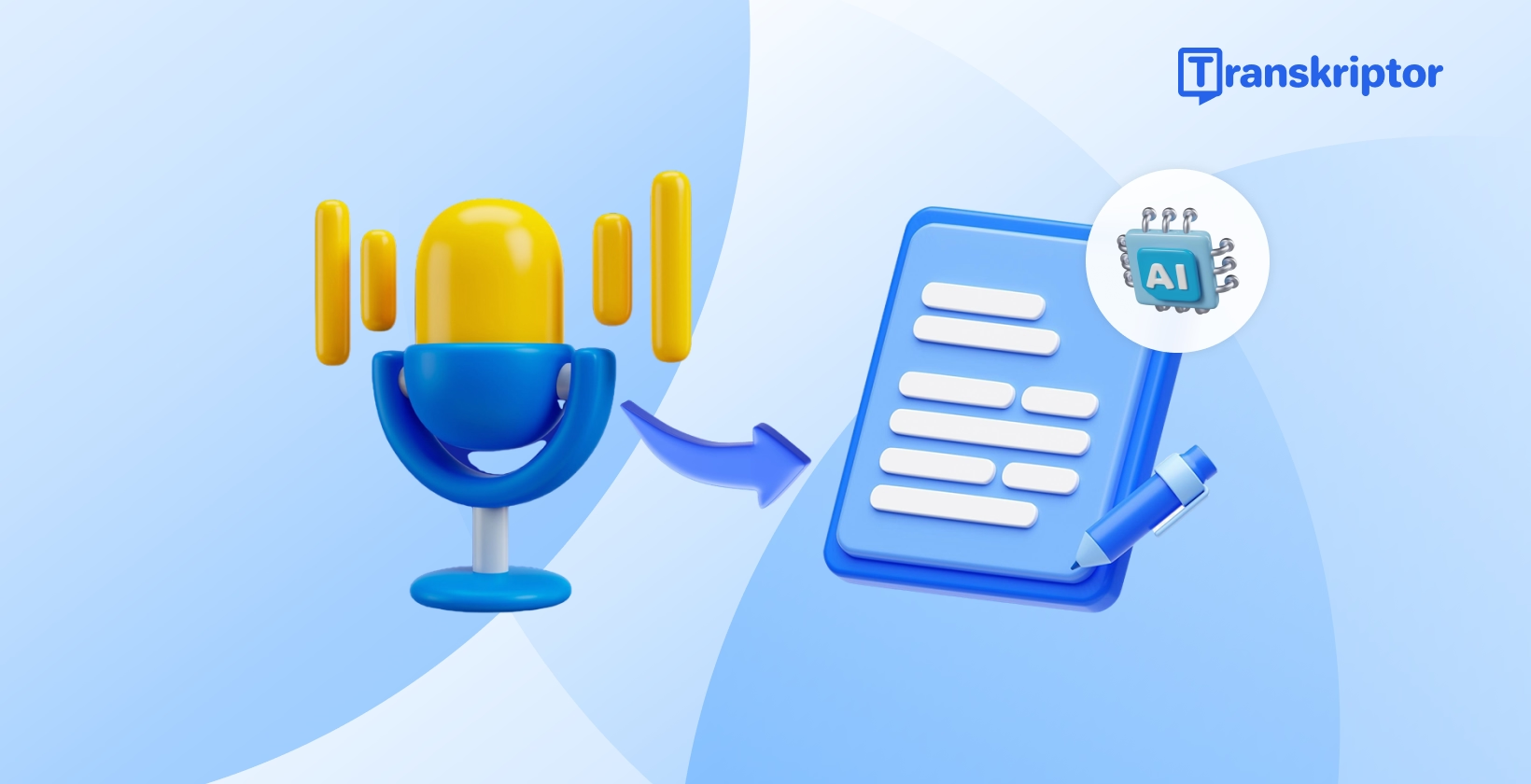AI-powered audio-to-text transcription is revolutionizing how we process spoken content, offering remarkable improvements in speed, accuracy, and accessibility. With advancements in machine learning and natural language processing (NLP), AI tools can now convert hours of audio into written text in a matter of minutes. This has far-reaching implications for various sectors, from businesses and educational institutions to content creators and professionals with accessibility needs.
By understanding the best AI transcription tools and how AI works in transcription streamlines workflows, you’ll be better equipped to improve efficiency, reduce costs, and create more inclusive content.
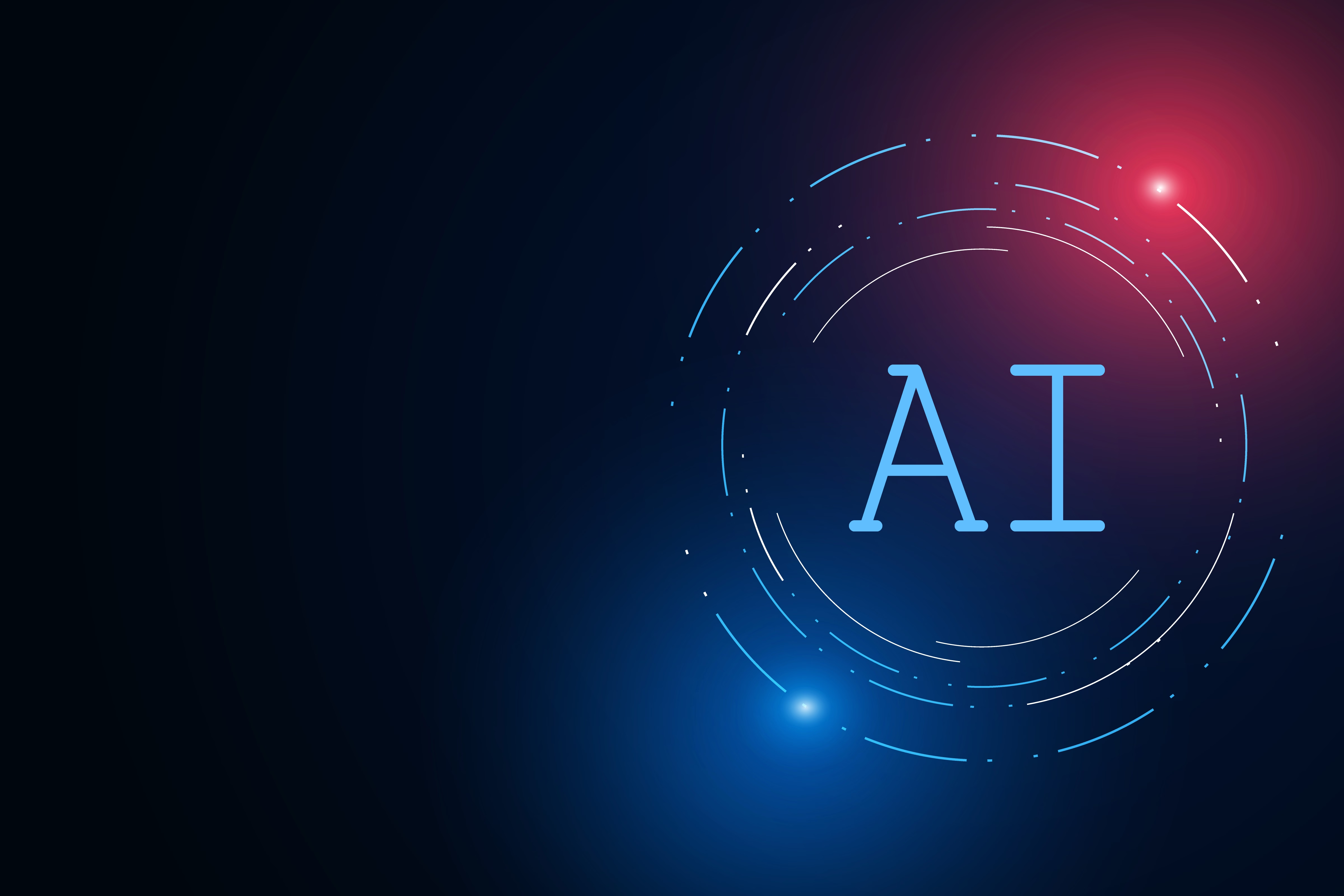
The Benefits of AI in Audio-to-Text Transcription
Here are the benefits of automated transcription software:
- Increased Speed and Efficiency: AI can transcribe the audio, reducing hours of manual work to minutes.
- Enhanced Accuracy: Modern AI transcription software recognizes diverse accents and complex vocabulary, minimizing errors.
- Accessibility Improvements: It is possible to make videos and podcasts accessible with audio transcription to individuals with hearing impairments by providing accurate captions.
- Cost-Effective Solutions: Automated tools eliminate the need for expensive human transcription services.
Increased Speed and Efficiency
One of the most significant advantages of AI in transcription is its ability to work in real time. Where manual transcription can take hours to process even short recordings, AI-powered tools can transcribe the same content in minutes or seconds.
Enhanced Accuracy
Modern AI transcription software has come a long way in terms of accuracy. With advanced algorithms, including machine learning and Natural Language Processing (NLP), these tools recognize diverse accents, speech patterns, and complex vocabulary.
Accessibility Improvements
AI plays a pivotal role in improving audio transcription accessibility. For individuals with hearing impairments, captions, and transcripts generated by AI enable access to multimedia content like podcasts, webinars, and videos. Converting speech into readable text, these tools help foster inclusivity, making digital content more accessible to a broader audience.
Cost-Effective Solutions
Manual transcription services can be costly, especially for large-scale projects or recurring needs. AI transcription tools provide a budget-friendly alternative by automating the process. Once set up, these tools can process recordings without additional human resources, lowering costs significantly.
Real-Time Applications
Real-time audio-to-text technology is a game-changer for live events, webinars, and online meetings. AI tools can generate captions and transcripts instantly, enhancing the user experience and enabling better engagement.
How AI Enhances Audio-to-Text Transcription
Here is how AI enhances audio transcription in various aspects:
- Natural Language Processing (NLP): AI transcription tools use NLP to understand context, ensuring that transcripts are more accurate and coherent.
- Noise Reduction and Speaker Identification: Advanced AI tools filter background noise and identify different speakers, ideal for interviews and group discussions.
- Multi-Language Support: Many AI-powered solutions support transcription in multiple languages, catering to global users.
- Integration with Workflow Tools: AI transcription software often integrates with platforms like Zoom, Microsoft Teams, and Dropbox for seamless workflows.
Natural Language Processing (NLP)
NLP is at the center of AI transcription technology. By understanding the context and meaning behind spoken words, NLP ensures that transcripts are coherent and relevant. Unlike basic speech recognition software, NLP-powered tools can interpret nuances in language, such as tone, grammar, and sentence structure, making the output more natural and accurate.
Noise Reduction and Speaker Identification
AI transcription tools are equipped with noise-reduction capabilities that filter out background sounds, ensuring clarity even in noisy environments. Advanced systems can also identify multiple speakers within a recording, attributing text to the correct individual. This feature is invaluable for interviews, meetings, and panel discussions where clarity and accuracy matter.
Multi-Language Support
AI-powered transcription tools are designed for global users. Many solutions support multiple languages, allowing businesses, researchers, and content creators to cater to international audiences. Whether it’s transcribing English, Spanish, French, or Mandarin, AI tools break language barriers and streamline communication.
Integration with Workflow Tools
Seamless integration with platforms like Zoom, Microsoft Teams, Google Drive, and Dropbox allows AI transcription tools to fit naturally into existing workflows. This eliminates the need for manual uploads or data transfers, saving time and reducing friction in the process.
Best AI-Powered Audio-to-Text Transcription Tools
Here are the best AI-powered audio-to-text transcription tools:
- Transkriptor: Transkriptor is an advanced AI transcription software known for its accuracy and speed.
- Otter.ai: Otter.ai excels in real-time speech-to-text solutions and team collaboration.
- Rev AI: Rev AI enables developers to integrate its high-accuracy transcription capabilities directly into their applications.
- Sonix: Sonix provides advanced features such as automated translation and audio search.
- Descript: Descript offers advanced features such as overdubbing, screen recording, and seamless audio editing.
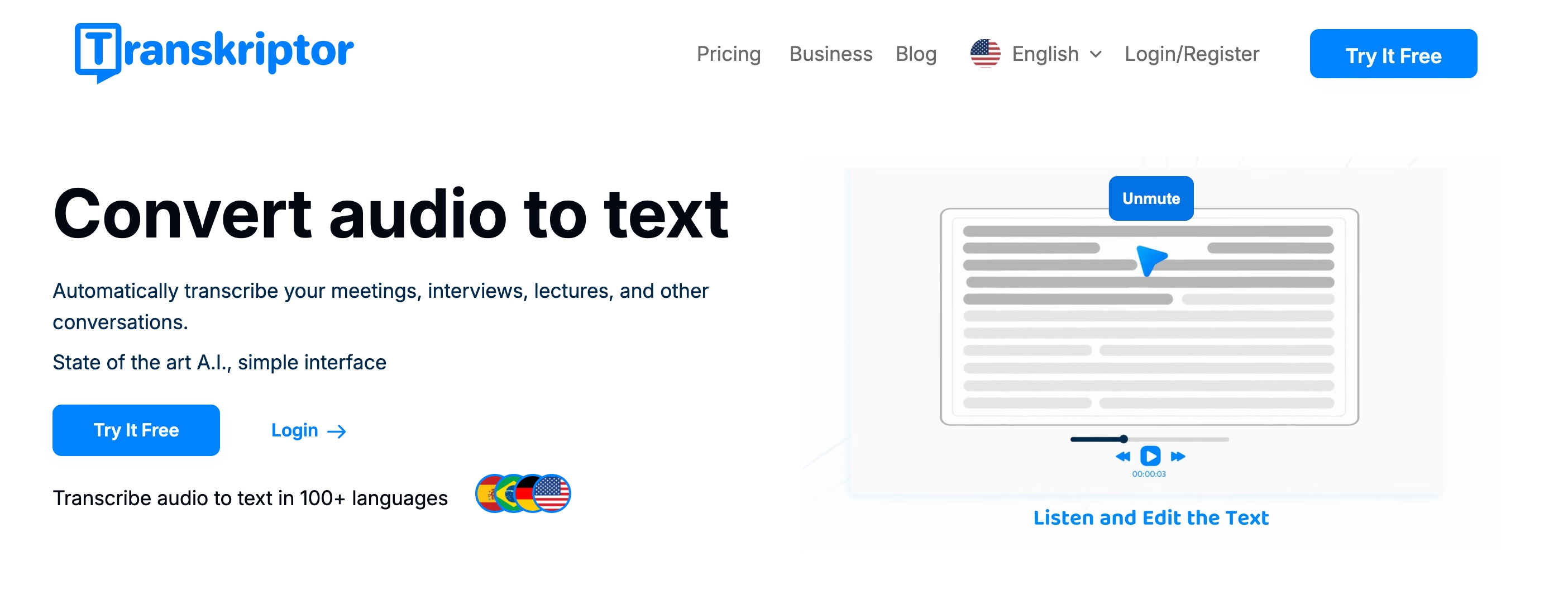
1. Transkriptor
One of the best tools for automated transcription, Transkriptor provides highly accurate transcription capabilities, supports multiple languages, and feature speaker differentiation. Users can easily upload files in various formats like MP3, WAV, and MP4. It also allows transcriptions to be exported in formats like DOCX, TXT, SRT and PDF, making it highly versatile for different tasks. It is best for professionals, students, and educators looking for a reliable and user-friendly transcription tool for lectures, interviews, or meetings.
Transkriptor combines accuracy and ease of use with robust features like speaker identification and customization options. It is ideal for academic research, business meetings, and any task that requires fast, accurate transcripts. Its affordability and multi-language support also make it attractive for global users.
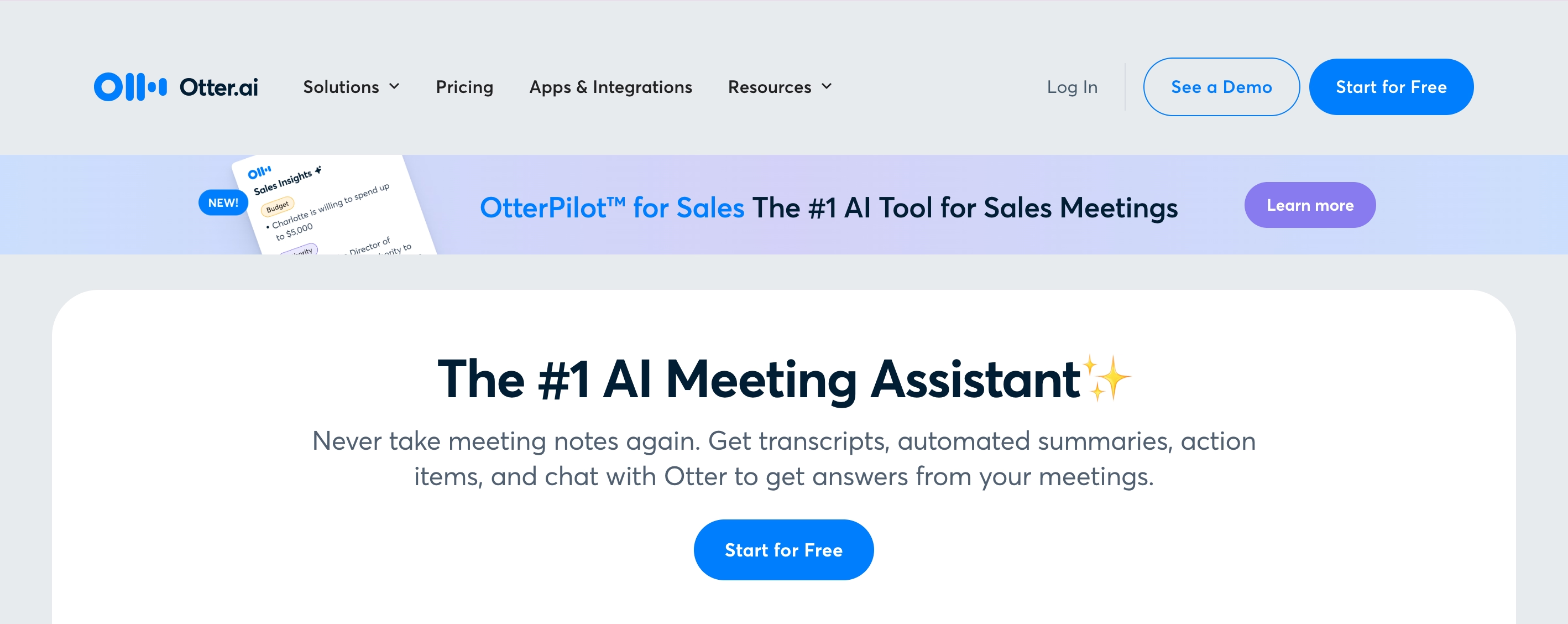
2. Otter.ai
Otter.ai excels in real-time transcription, team collaboration, and intelligent keyword tagging. It integrates seamlessly with platforms like Zoom, Google Meet, and Microsoft Teams. It is best for teams and professionals working in collaborative environments, such as businesses, online classrooms, and project management groups.
Otter.ai’s ability to provide live transcripts, keyword highlights, and speaker identification makes it perfect for improving team productivity and communication. It offers organized transcripts with searchable keywords, helping users quickly locate specific parts of a conversation.
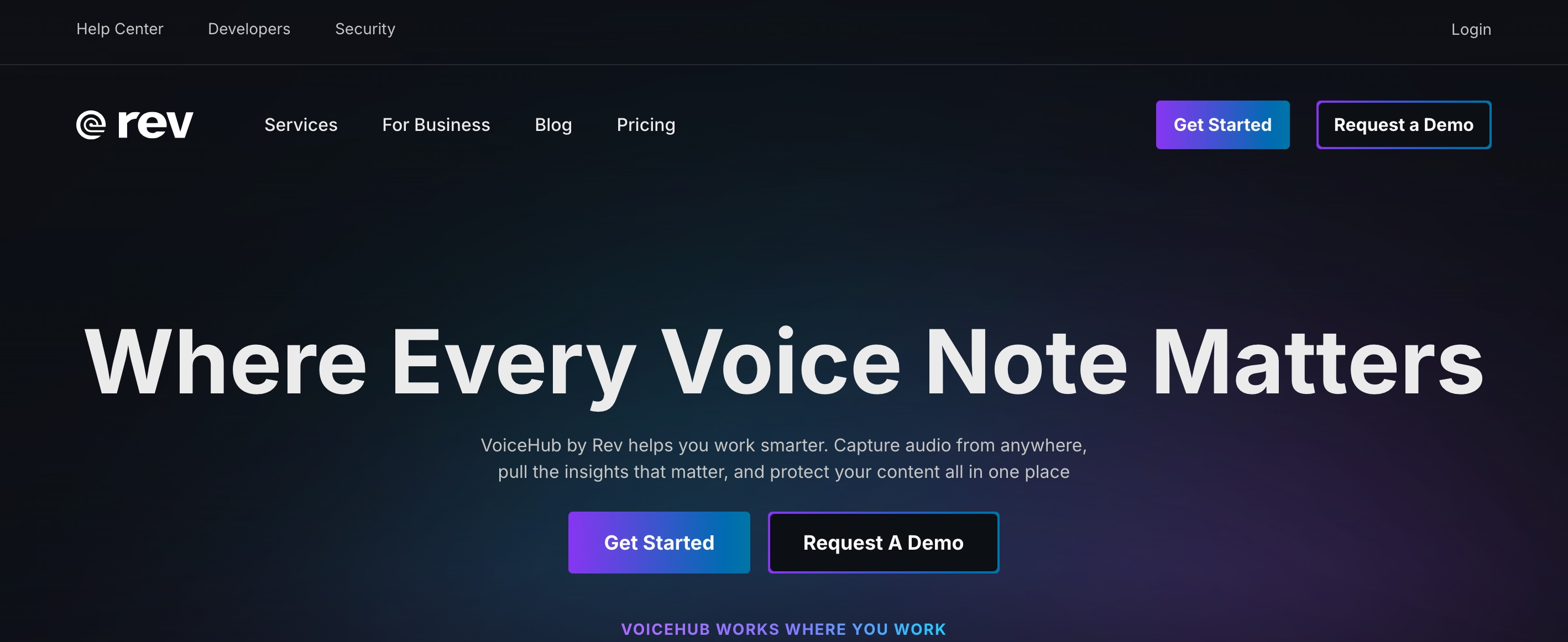
3. Rev AI
Rev AI offers an API-based solution for transcription, enabling developers to integrate its high-accuracy transcription capabilities directly into their applications. Rev AI is best for developers and businesses needing transcription solutions that seamlessly integrate into their software, apps, or workflows.
Rev AI focuses on customization and scalability for large-scale projects, making it a go-to choice for enterprises and developers. Its accuracy in technical and industry-specific terminology sets it apart from general tools.
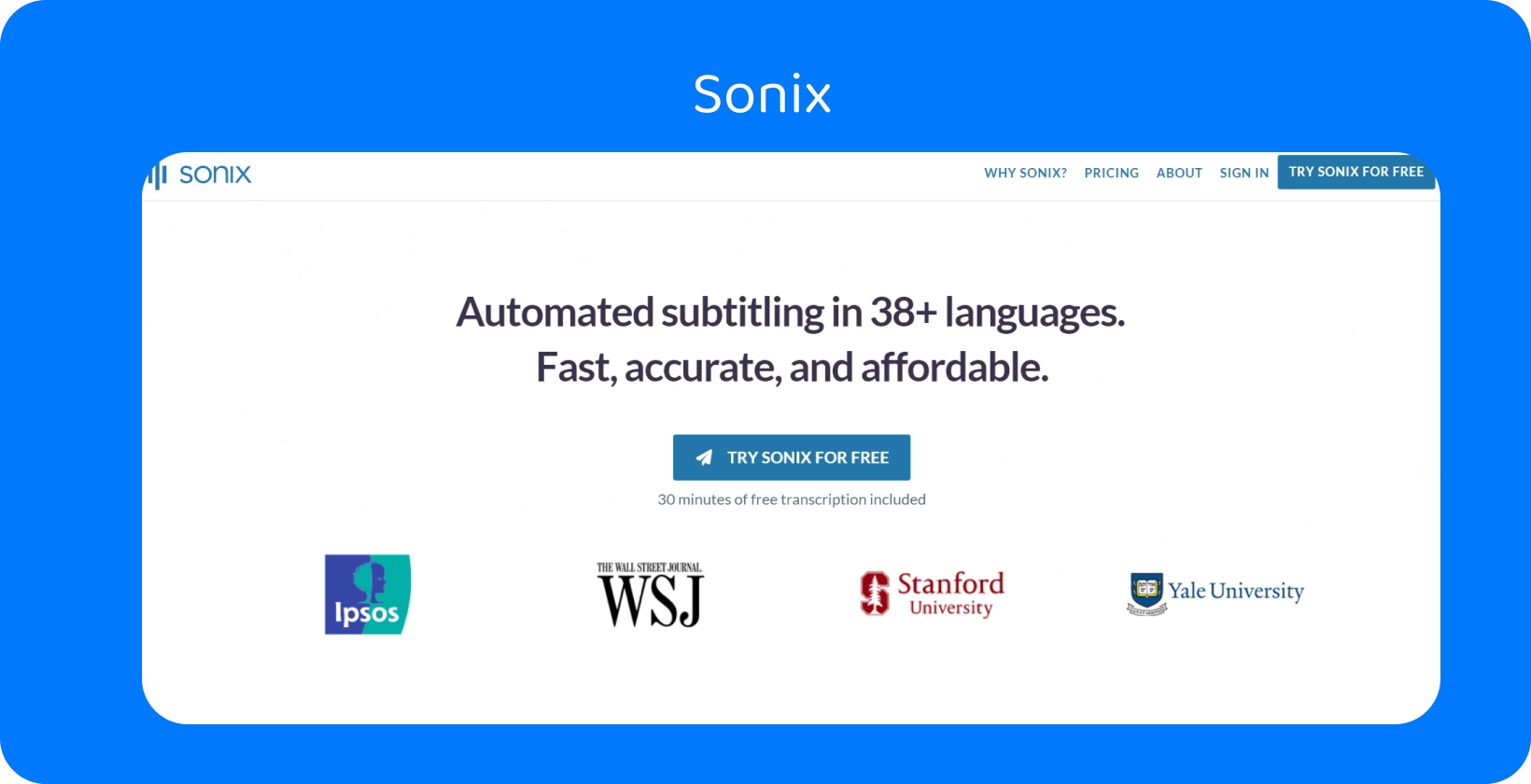
4. Sonix
Sonix provides advanced features such as automated translation, audio search, and multi-language transcription. It allows users to edit and refine transcripts using its interactive text editor and supports translations into over 30 languages. It is best for content creators, international teams, and businesses working across language barriers.
Sonix’s ability to provide transcription and translation in a single tool makes it ideal for global users. Its audio search feature helps users locate specific words or phrases within long recordings, which is especially beneficial for podcast producers and journalists.
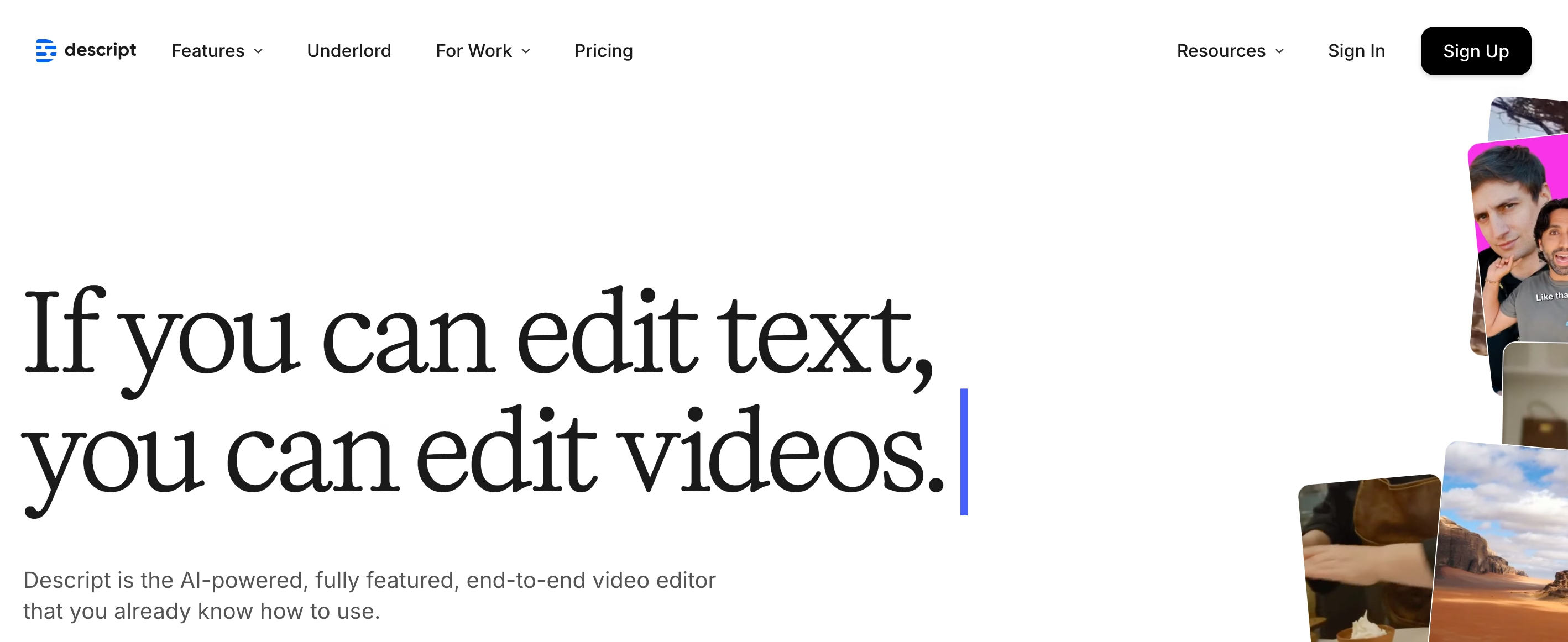
5. Descript
Descript’s standout features include overdubbing, screen recording, and seamless audio editing alongside text transcription. Users can cut, move, and edit audio directly within the transcript. It is best for podcasters, video editors, and multimedia content creators looking for an all-in-one tool for production and transcription.
Descript revolutionizes the editing process by treating audio like text. It is a powerful solution for podcast creators, YouTubers, and marketers who need transcription and editing in a single platform. Its innovative features, like overdubbing, save time and enhance production quality.
How to Use Transkriptor for Audio-to-Text Transcription
Here is a step-by-step guide to use Transkriptor for audio-to-text transcription:
- Upload Your Audio File
- Let AI Do the Work
- Edit and Refine the Transcript
- Export in Multiple Formats
- Share or Use the Text
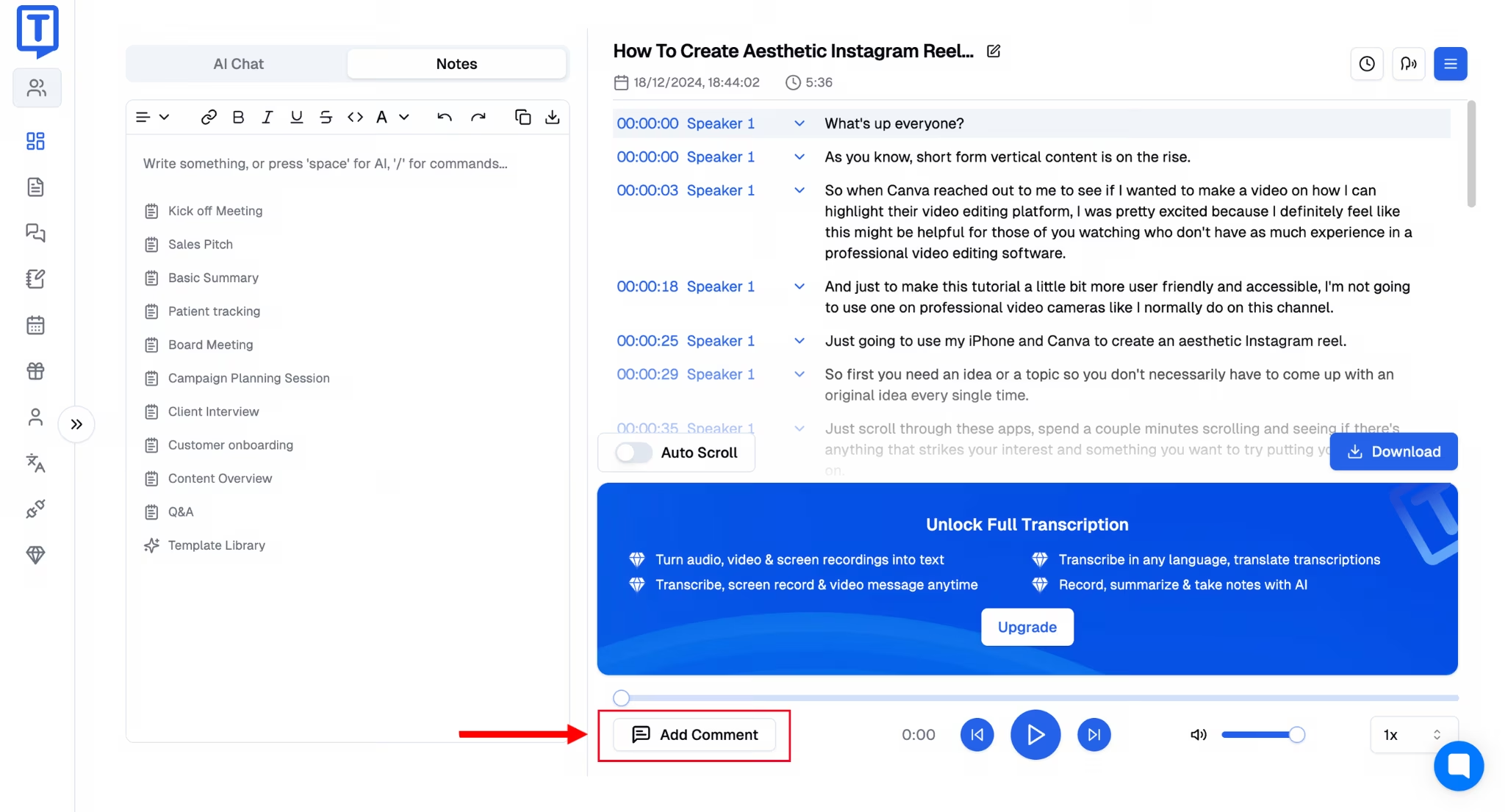
Step 1: Upload Your Audio File
Navigate to the Transkriptor’s website and sign in to your account. Transkriptor supports various file formats such as MP3, WAV, or MP4. Upload your audio file into the tool. Make sure that your audio file is high-quality for the best results.
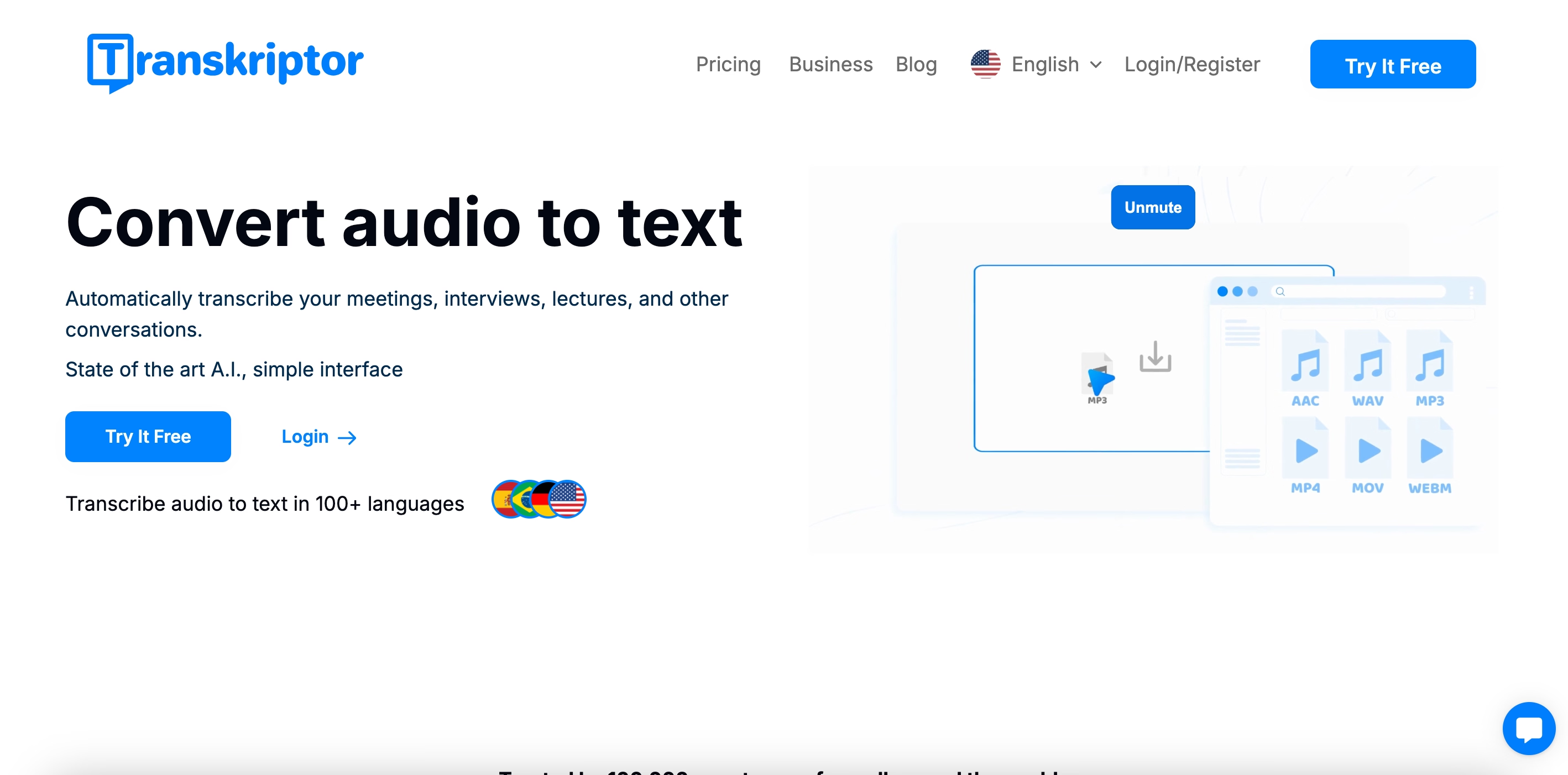
Step 2: Let AI Do the Work
Once the file is uploaded, Transkriptor’s advanced AI technology starts the transcription of your recording. Depending on the file size and quality, the processing time can vary, but it is significantly faster than manual transcription, typically taking just a few minutes for most recordings.
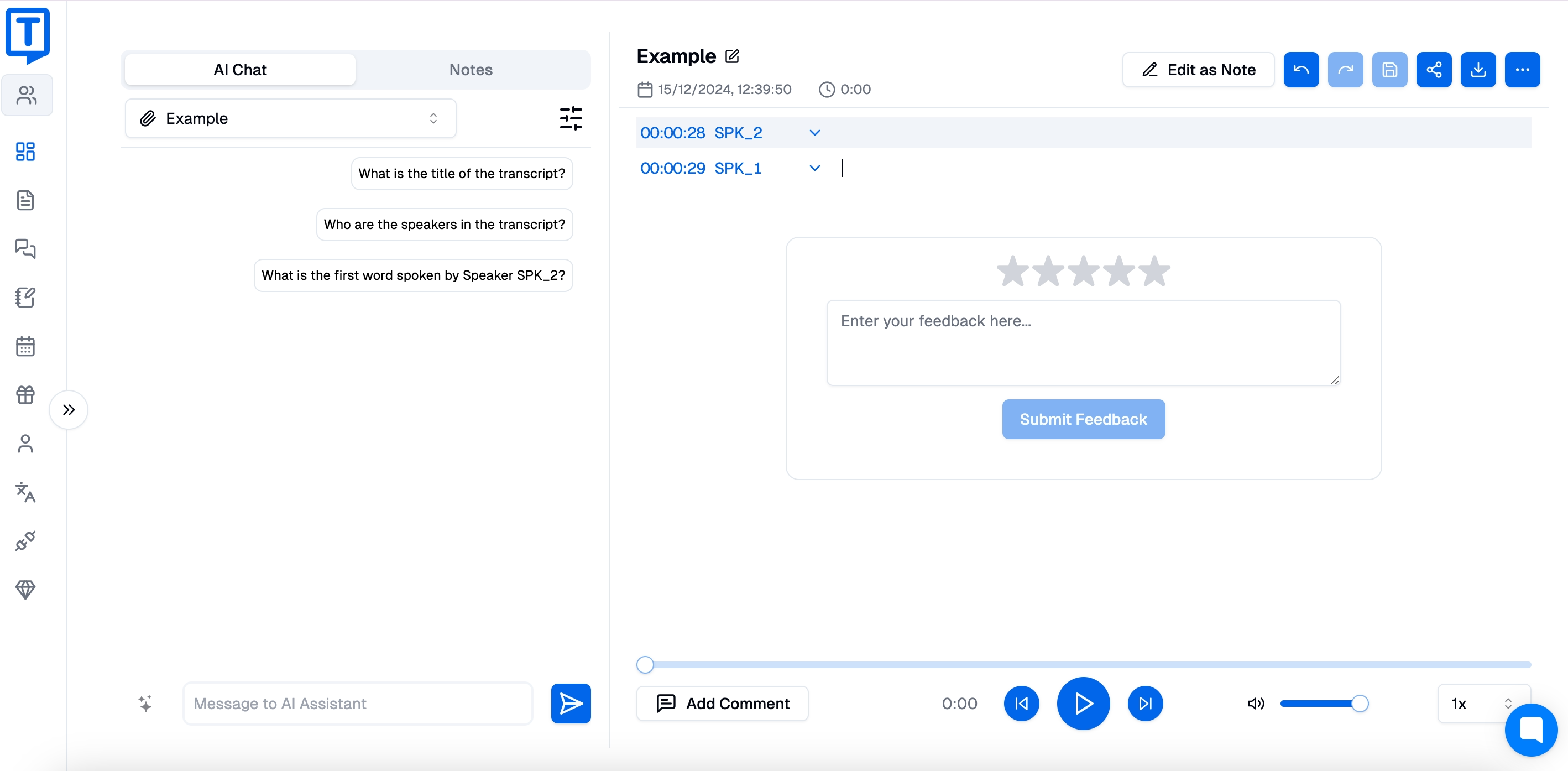
Step 3: Edit and Refine the Transcript
After the transcription is done, you can use the intuitive editor to refine your transcript. The proofreading and editing process is necessary for the best results with any tool you use. Within Transkriptor, you can correct any minor errors or misheard words and identify and rename speakers for added clarity. You can also adjust punctuation and formatting to suit your needs.

Step 4: Export in Multiple Formats
Once you are satisfied with the edited transcript, Transkriptor offers versatile export options to ensure compatibility with your workflow. Users can download the transcript in various formats, including TXT, PDF, SRT and DOCX. These export options make it easy to integrate the transcript into reports, presentations, captions for videos, or research documentation.
Step 5: Share or Use the Text
You can share the transcription file after you’ve selected the format you desire. Utilize this transcript for reports, captions, or documentation as needed. Sharing transcripts ensures better communication, collaboration, and inclusivity across teams and audiences.
Key Features to Look for in AI Transcription Tools
We’ve listed the key features to look for in AI transcription tools before selecting one:
- Accuracy in Noisy Environments: Select software that can handle background noise without compromising transcription quality.
- Multi-Speaker Identification: Look for tools that differentiate between speakers for interviews or group discussions.
- Integration with Other Platforms: Ensure compatibility with your existing tools, like Zoom or Google Drive.
- Cost and Scalability: Evaluate pricing models and ensure the tool can grow with your needs.
Accuracy in Noisy Environments
One of the most significant factors in transcription quality is the tool's ability to handle noisy or less-than-ideal recording conditions. Advanced speech recognition tools use noise reduction and filtering algorithms to suppress background sounds, ensuring the audio is clear and the text is accurate.
Multi-Speaker Identification
For meetings, interviews, and panel discussions, multi-speaker identification is crucial. This feature allows the tool to differentiate between speakers and assign labels to each one in the transcript. It simplifies reviewing and analyzing conversations by clearly segmenting who said what.
Integration with Other Platforms
Modern workflows require seamless compatibility between tools. Leading AI transcription software integrates with popular platforms and services such as Zoom for live meetings and webinar transcriptions and Google Drive for automatic file uploads and storage. Integrations save time and effort by reducing manual steps like file uploads or data transfers.
Cost and Scalability
Pricing models vary across AI transcription tools. It’s essential to evaluate whether the tool offers value for money based on your needs. Key considerations include free or paid plans and pay-as-you-go or subscription plans. Some tools, such as Transkriptor, offer limited free plans or trial options so that you can see how the tool works.
Tips for Maximizing AI Transcription Efficiency
Here are the tips for maximizing AI transcription efficiency:
- Start with High-Quality Audio: Clear recordings ensure better transcription accuracy. Minimize background noise and use good-quality microphones.
- Regularly Review and Edit Transcripts: While AI is highly accurate, manual review ensures context-specific adjustments.
- Organize and Tag Transcripts: Use tags or categories to easily find and retrieve specific transcripts later.
- Explore Advanced Features: Take advantage of features like keyword search, translation, and real-time collaboration.
Start with High-Quality Audio
The accuracy of AI transcription tools heavily depends on the quality of the audio being processed. Clear, high-quality recordings help minimize errors and ensure the tool can distinguish words accurately. Invest in reliable microphones that reduce distortion and pick up clear sound. Record in a quiet environment to avoid interruptions or competing sounds.
Regularly Review and Edit Transcripts
While AI transcription tools have advanced in terms of accuracy, they are not infallible. Factors like context, specialized terminology, and regional accents can occasionally lead to minor errors or ambiguities. AI transcription tools may struggle with nuances such as pauses, sentence breaks, or speaker differentiation. Manually editing punctuation and structure makes the transcript more polished and readable.
Organize and Tag Transcripts
Efficient organization is key to improving productivity with transcription. AI tools often produce large volumes of data, and keeping track of these files can be challenging without a proper system in place. You can implement tags, keywords, or folder systems to categorize transcripts based on themes, speakers, events, or projects.
Explore Advanced Features
Modern AI transcription tools offer a wide range of features beyond basic automated speech-to-text solutions. These advanced features include keyword search, translation, and real-time collaboration. Leveraging these advanced functionalities can help you work smarter and get more value from the tool.
The Future of AI in Audio-to-Text Transcription
Here is the possible future of AI in audio-to-text transcription:
- Greater Accuracy with Machine Learning: AI transcription tools will continue to improve with advancements in machine learning algorithms.
- Broader Language and Accent Support: Expect more tools to support diverse languages and regional accents.
- Seamless Integration into Daily Workflows: AI transcription will become a standard feature in productivity suites, streamlining workflows even further.
- Increased Accessibility Applications: AI transcription will drive greater inclusivity by making content accessible to people with hearing impairments.
Greater Accuracy with Machine Learning
Advancements in machine learning algorithms will continue to push the boundaries of AI transcription accuracy. AI tools are now capable of recognizing complex speech patterns, accents, and intonation, but the future holds even more promises. With improvements in NLP, AI will better understand the context, grammar, and nuances of human speech, reducing the likelihood of misinterpretation.
Broader Language and Accent Support
One of the most significant developments in AI transcription will be its ability to support a wider range of languages, dialects, and accents. Currently, transcription tools primarily focus on widely spoken languages like English, Spanish, or Mandarin. However, with future improvements, AI will incorporate underrepresented languages, dialects, and indigenous tongues, enabling global users to access transcription services.
Seamless Integration into Daily Workflows
AI transcription is expected to become a core component of productivity tools and daily workflows across industries. As technology evolves, transcription tools will integrate seamlessly with platforms that professionals already use. Expect AI transcription to be embedded directly into email platforms, virtual meeting tools, project management software, and document editors.
Increased Accessibility Applications
AI transcription technology has immense potential to drive inclusivity and accessibility across the globe. By converting audio recordings into text, these tools make information more accessible to individuals with hearing impairments or other disabilities. AI tools will provide real-time, highly accurate captions for videos, presentations, and live events, making content universally accessible.
Conclusion
AI-powered audio-to-text transcription is reshaping the way we handle and interact with audio content. The speed and accuracy offered by AI transcription tools such as Transkriptor have made it easier than ever to transcribe interviews, meetings, lectures, and multimedia content, improving productivity and accessibility. By choosing the right AI transcription tool, you can significantly enhance your workflow, foster collaboration, and ensure content is accessible to a wider audience.
